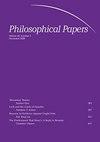认识论去殖民化
IF 1.3
3区 哲学
0 PHILOSOPHY
引用次数: 6
摘要
认识论的非殖民化,在其各种概念表述和表现中,可以被认为是完成反殖民斗争或前殖民和被压迫的自我重新发现的希望。在非洲,这个项目有着悠久的历史,既是对西方认识论优势的霸权历史的反击,也是对种族主义理论和针对非洲裔黑人的种族主义实践的反击。不完全清楚的是非殖民思想和实践的确切成就。我对非殖民化作为一种思想和实践形式在非洲大陆的相关性、使用和延续进行了质疑,其背景是长期存在的物质不发达和政治空间被压抑的问题,这些问题使非殖民化的假定受益者成为无望的主体,他们在自己的家园继续被剥夺权力和受压迫。这一质询将与另一项旨在评价非洲哲学作为一种认识上的非殖民化形式的成就的调查一起进行。如果非洲哲学是一种非殖民化形式,它应该能够清楚地表明它的成就,以及它们如何对非洲大陆非殖民化和赋予居民权力的更广泛目标产生影响。本文章由计算机程序翻译,如有差异,请以英文原文为准。
Whither Epistemic Decolonization
Abstract Epistemic decolonization, in its various conceptual formulations and presentations, could be taken to hold promise for either the completion of the anti-colonial struggle or the self-re-discovery of the formerly colonized and oppressed. In Africa this project has had a long history as both a counter to hegemonic histories of claimed Western epistemological superiority as well as theories of racism and racist practices against black people of African descent. What is not entirely clear are the precise achievements of decolonial thought and practice. I interrogate the relevance, use and continuation of decoloniality as a genre of thought and practice on the African continent against the background of the perennial problems of material underdevelopment and stifled political spaces that render the supposed beneficiaries of decolonization hopeless subjects who continue to be disempowered and oppressed in their own home. This interrogation is to be carried alongside another inquiry aimed at evaluating the achievements of African philosophy as a form of epistemic decolonization. If African philosophy is a form of decolonization, as it should be, it should be able to clearly demonstrate its achievements and how they have had an effect on broader goals of decolonizing and empowering inhabitants of the African continent.
求助全文
通过发布文献求助,成功后即可免费获取论文全文。
去求助
来源期刊

Philosophical Papers
PHILOSOPHY-
CiteScore
2.10
自引率
0.00%
发文量
18
期刊介绍:
Philosophical Papers is an international, generalist journal of philosophy edited in South Africa Original Articles: Articles appearing in regular issues are original, high-quality, and stand-alone, and are written for the general professional philosopher. Submissions are welcome in any area of philosophy and undergo a process of peer review based on initial editor screening and refereeing by (usually) two referees. Special Issues: Topic-based special issues are comprised of both invited and submitted papers selected by guest editors. Recent special issues have included ''Philosophy''s Therapeutic Potential'' (2014, editor Dylan Futter); ''Aging and the Elderly'' (2012, editors Tom Martin and Samantha Vice); ''The Problem of the Criterion'' (2011, editor Mark Nelson); ''Retributive Emotions'' (2010, editor Lucy Allais); ‘Rape and its Meaning/s’ (2009, editor Louise du Toit). Calls for papers for upcoming special issues can be found here. Ideas for future special issues are welcome.
 求助内容:
求助内容: 应助结果提醒方式:
应助结果提醒方式:


